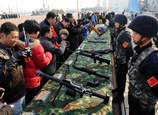
It is obviously important to properly handle China-U.S. relations given their global influence. The two countries have the duty to break the traditional pattern that a rising great power and an existing great power is bound to come into conflict.
Beijing and Washington have long reached a consensus on building a partnership on the basis of mutual respect and mutual benefit. The White House has repeatedly said that China’s rise does not mean the decline of the United States, and it welcomes a strong, prosperous, and successful China that plays a greater role in world affairs. However, the United States has lost its composure when implementing the consensus. For example, the U.S. Congress recently passed the National Defense Authorization Act for Fiscal Year 2013, which contains controversial articles related to the Diaoyu Islands and arms sales to Taiwan. This is obvious interference in China’s sovereignty and internal affairs. Both countries have just finished their leadership elections, and China-U.S. relations have entered an important transitional period. Such defense bill can only inject “negative energy” into China-U.S. relations.
America’s lack of composure reflects the complexity of China-U.S. relations. No matter how China reiterates the path of peaceful development and shows good will in practice, the United States remains distrustful of China. The United States has a tradition of creating imaginary enemies, and China seems to be qualified as its imaginary enemy from cultural, historical, and social perspectives. However, imaginary enemies are “imaginary” for a reason, and it is unwise to translate strategic mistrust into strategic confrontation.















 Many parts of Jiangsu see snowfall
Many parts of Jiangsu see snowfall


![]()
